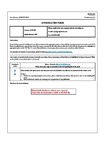Overestimated crash risks of young and elderly drivers.
| dc.contributor.author | Rolison, JJ | en |
| dc.contributor.author | Moutari, S | en |
| dc.contributor.author | Hewson, PJ | en |
| dc.contributor.author | Hellier, E | en |
| dc.date.accessioned | 2014-03-17T11:35:42Z | |
| dc.date.accessioned | 2014-03-17T11:42:23Z | |
| dc.date.available | 2014-03-17T11:35:42Z | |
| dc.date.available | 2014-03-17T11:42:23Z | |
| dc.date.issued | 2014-01 | en |
| dc.identifier.uri | http://hdl.handle.net/10026.1/2915 | |
| dc.description.abstract |
BACKGROUND: Young and elderly drivers are reported to have markedly greater crash rates than drivers of other ages, but they travel less frequently and represent a minority of road users. Consequently, many crashes involving young or elderly drivers also involve drivers of middle age ranges who travel more frequently. PURPOSE: To examine crash rates of young and elderly drivers, controlling for ages of all drivers involved in collisions. METHODS: A retrospective longitudinal study conducted on population-wide two-vehicle crashes reported in Great Britain from 2002 through 2010 for driver age ranges (17-20, 21-29, 30-39, 40-49, 50-59, 60-69, ≥70 years) and individual driver ages among those aged 17-20 years. Annual trips made, recorded as part of a National Travel Survey, were used to estimate trip-based driver crash rates. RESULTS: Crash rates of drivers aged 17-20 years were not significantly different from crash rates of drivers aged 21-29 years (rate ratio=1.14; 95% CI=0.96, 1.33) when controlling for ages of both drivers involved in two-car collisions, and drivers aged 17 years had the lowest crash rate among drivers aged 17-20 years. Crash rates of drivers aged ≥70 years equaled crash rates of drivers aged 60-69 years (rate ratio=1.00; 95% CI=0.77, 1.32) and were 1.40 times (95% CI=1.10, 1.78) lower than crash rates of drivers aged 50-59 years. CONCLUSIONS: The current findings are in contrast with reports of high crash risks among young and elderly drivers, and suggest that previous reports may have overestimated the crash risks of these drivers by failing to control for ages of all drivers involved in collisions. | en |
| dc.format.extent | 58 - 64 | en |
| dc.language | eng | en |
| dc.language.iso | eng | en |
| dc.relation.replaces | http://hdl.handle.net/10026.1/2911 | |
| dc.relation.replaces | 10026.1/2911 | |
| dc.subject | Accidents, Traffic | en |
| dc.subject | Adolescent | en |
| dc.subject | Adult | en |
| dc.subject | Age Factors | en |
| dc.subject | Aged | en |
| dc.subject | Female | en |
| dc.subject | Humans | en |
| dc.subject | Longitudinal Studies | en |
| dc.subject | Male | en |
| dc.subject | Middle Aged | en |
| dc.subject | Retrospective Studies | en |
| dc.subject | Risk Assessment | en |
| dc.subject | Young Adult | en |
| dc.title | Overestimated crash risks of young and elderly drivers. | en |
| dc.type | Journal Article | |
| plymouth.author-url | https://www.ncbi.nlm.nih.gov/pubmed/24355672 | en |
| plymouth.issue | 1 | en |
| plymouth.volume | 46 | en |
| plymouth.publication-status | Published | en |
| plymouth.journal | Am J Prev Med | en |
| dc.identifier.doi | 10.1016/j.amepre.2013.08.014 | en |
| plymouth.organisational-group | /Plymouth | |
| plymouth.organisational-group | /Plymouth/REF 2021 Researchers by UoA | |
| plymouth.organisational-group | /Plymouth/REF 2021 Researchers by UoA/UoA04 Psychology, Psychiatry and Neuroscience | |
| plymouth.organisational-group | /Plymouth/Research Groups | |
| plymouth.organisational-group | /Plymouth/Research Groups/Centre for Brain, Cognition and Behaviour (CBCB) | |
| plymouth.organisational-group | /Plymouth/Research Groups/Centre for Brain, Cognition and Behaviour (CBCB)/Behaviour | |
| dc.publisher.place | Netherlands | en |
| dcterms.dateAccepted | 2013-08-27 | en |
| dc.identifier.eissn | 1873-2607 | en |
| dc.rights.embargoperiod | Not known | en |
| rioxxterms.versionofrecord | 10.1016/j.amepre.2013.08.014 | en |
| rioxxterms.licenseref.uri | http://www.rioxx.net/licenses/all-rights-reserved | en |
| rioxxterms.licenseref.startdate | 2014-01 | en |
| rioxxterms.type | Journal Article/Review | en |


